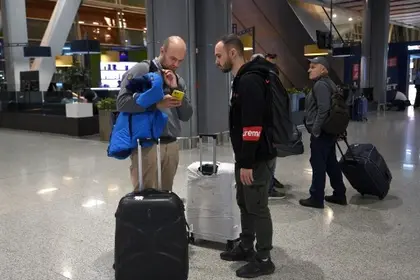Russian President Vladimir Putin announced partial mobilization on September 21 for his war on Ukraine, resulting in many Russian men seeking out ways to avoid being sent to the front lines.
Russian conscripts are rushing to buy plane tickets, for which prices have become dramatically inflated, and ‘mile-long’ queues can be seen at borders and airports. Russian conscripts are mostly fleeing to Armenia, Georgia, and Turkey
JOIN US ON TELEGRAM
Follow our coverage of the war on the @Kyivpost_official.
How have European leaders reacted to the possibility of Russian deserters?
The Minister of Foreign Affairs of Latvia, Edgars Rinkevics, said Latvia would not be issuing humanitarian visas to Russians who want to leave the country to avoid the mobilization announced by Russian President Vladimir Putin.
“Many Russians who now flee Russia because of mobilization were fine with killing Ukrainians. They did not protest then, and it is wrong to consider them conscientious objectors. There are considerable security risks admitting them and plenty of countries outside the EU to go to,” he wrote on Friday, Sep. 23.
Estonian Prime Minister Kaya Kallas said in an interview with CNN on Sep. 22 that Estonia would not be granted political asylum to citizens of Russia who want to avoid mobilization and flee the country. She emphasized that citizens are responsible for their countries.
“We provide asylum here to Ukrainian refugees from the war. And each city is responsible for its own country, so the citizens of Russia are too. Therefore, we will not provide asylum – this is not a reason for Russian men to flee the country,” she said.

British Defence Intelligence Update Ukraine 23 January 2025
Kallas emphasized that Russians should “stand up and say that they are against this war and end it once and for all.”
The Border Service of Finland said on Sep. 22 that it would allow Russians fleeing mobilization in Russia subject to a decision to be made by Finnish leaders.
“We are implementing signed international agreements. And people can seek asylum in Finland,” the Finnish border service press secretary told the EU Observer.
“In general, if Russians come to Finland and ask for asylum normally, we will be obliged to consider this request,” he explained.
According to the German online paper Oldenburger Onlinezeitung, German Interior Minister Nancy Feather said on Sep. 22 that Germany is ready, under certain circumstances, to provide asylum to deserters from the Russian army and “opponents of the Putin regime.”
“As a rule, deserters threatened with severe repression receive international protection in Germany. Anyone who courageously opposes the Putin regime and, therefore, exposes himself to the greatest danger can apply for asylum in Germany due to political persecution,” Feather said.
The German pro-immigration organization Pro Asyl issued a similar statement, calling on all EU countries to give asylum to Russians trying to escape forced mobilization.
“According to EU law, those who avoid a war that violates international law are entitled to asylum and protection. In this sense, Germany and Europe should organize non-bureaucratic admission of people who vote with their feet against Russia’s aggressive war,” Radio Liberty reported, quoting a statement from Pro Asyl.
The Pro Asyl statement was supported by members of the Free Democratic Party of Germany and the Green Party.
Czech Foreign Minister Jan Lipovsky said that Russians fleeing Russia to avoid mobilization do not qualify for a humanitarian visa in the Czech Republic. Speaking to the CTK agency on Sep. 22, he said:
“I understand that the Russians are fleeing from Putin’s more desperate decisions. But those who flee the country because they do not want to fulfill the obligations imposed by their state do not meet the conditions for a humanitarian visa.”
At the same time, Czech Prime Minister Petr Fiala said in a pre-election debate that the country would treat potential deserters as asylum seekers. He added that the Czech government had not seen signs of an influx of Russians who wanted to avoid mobilization.
You can also highlight the text and press Ctrl + Enter










